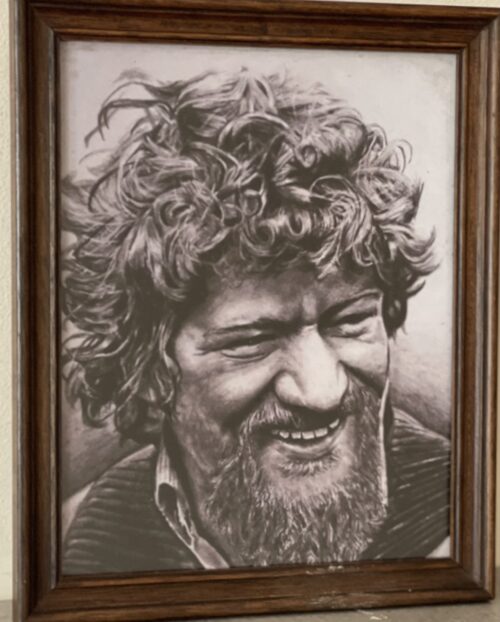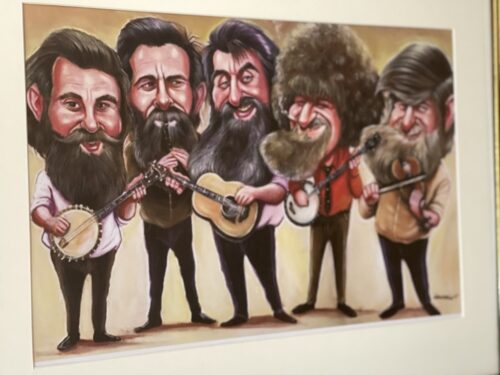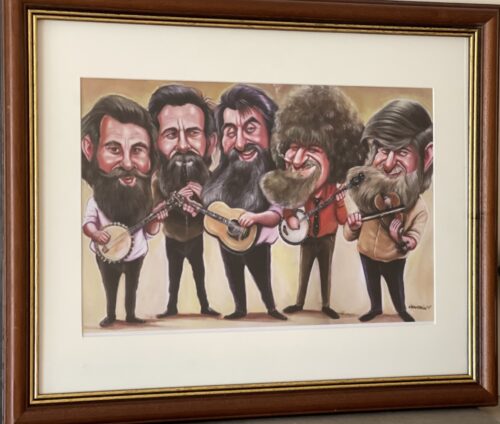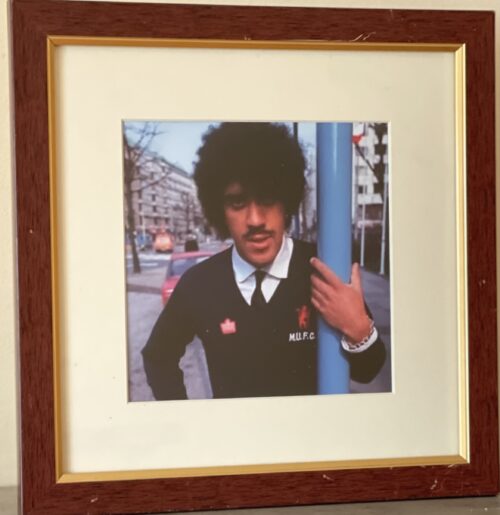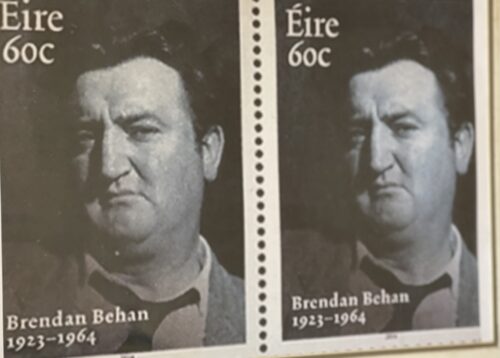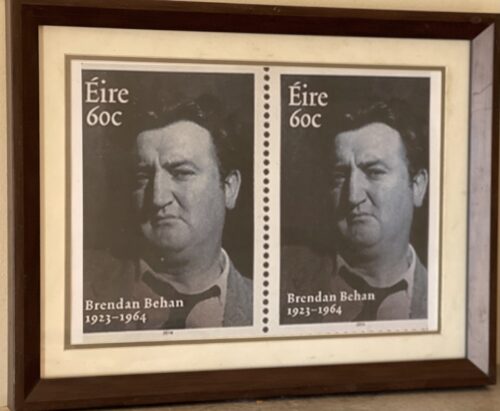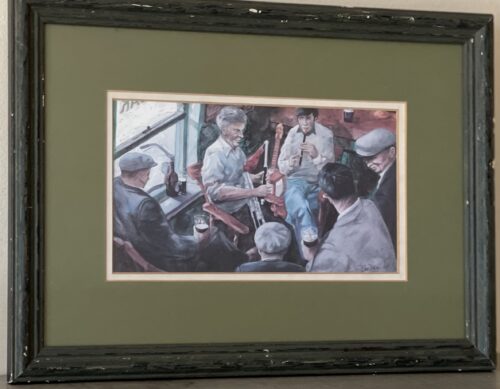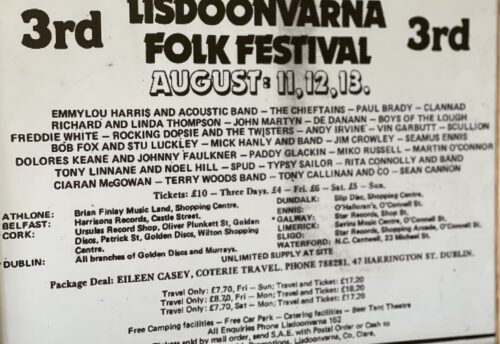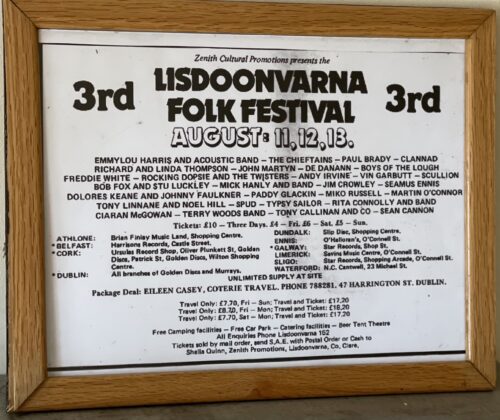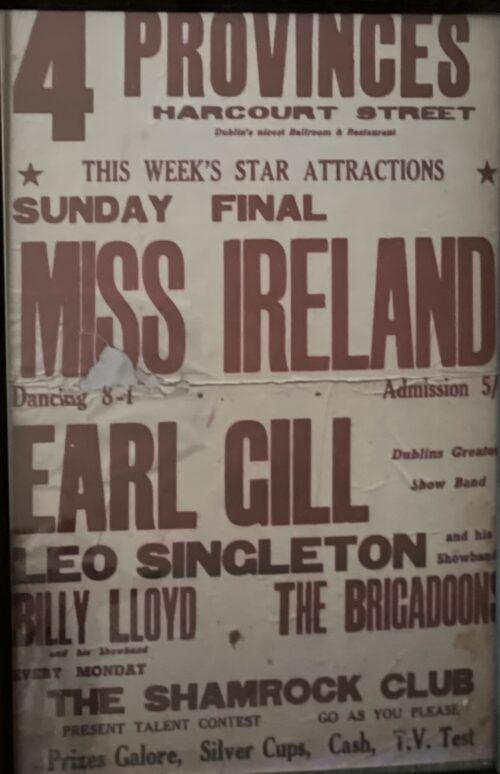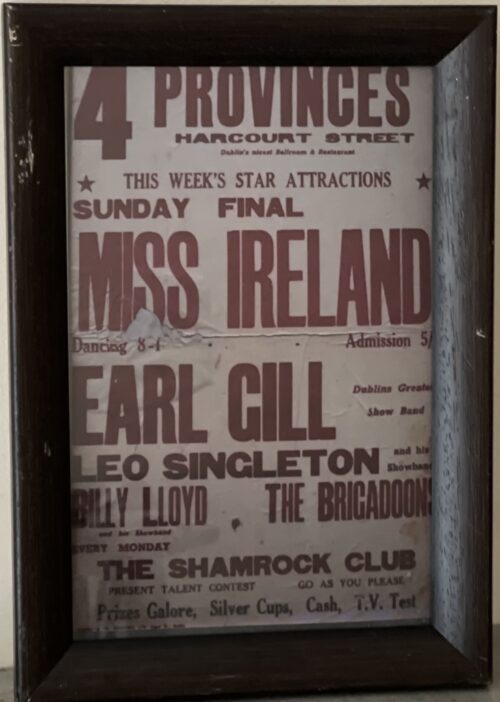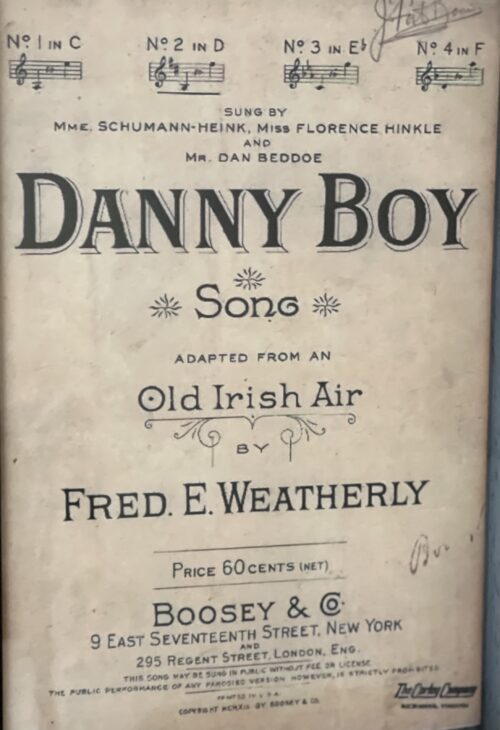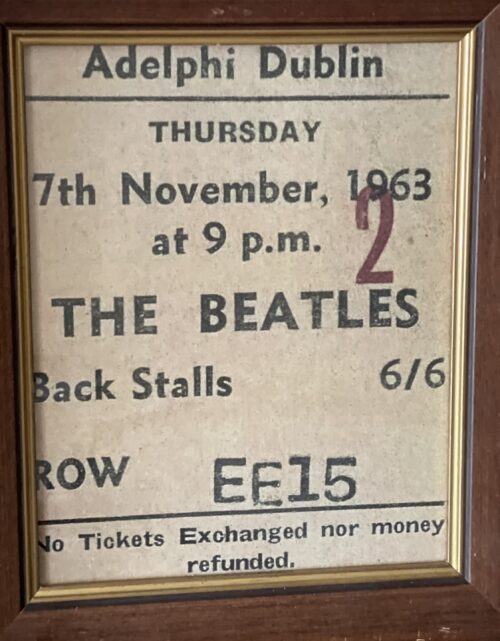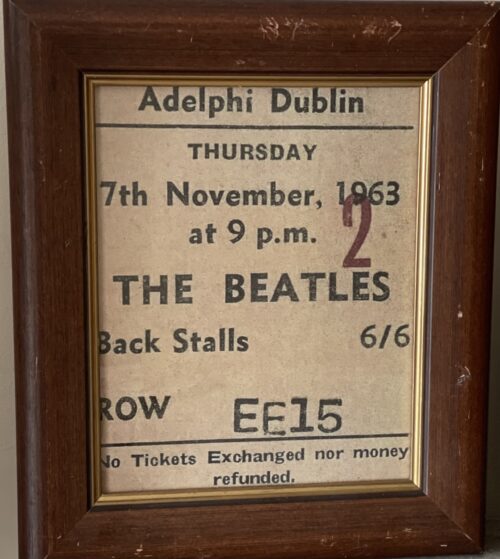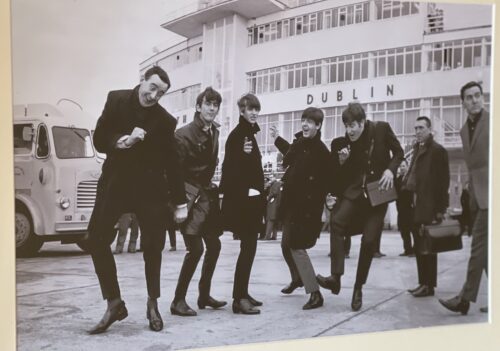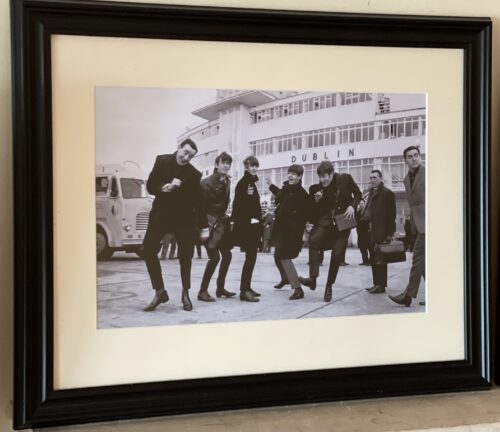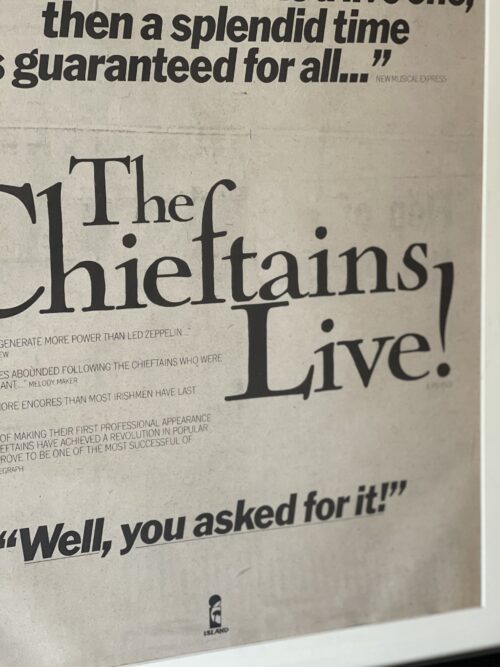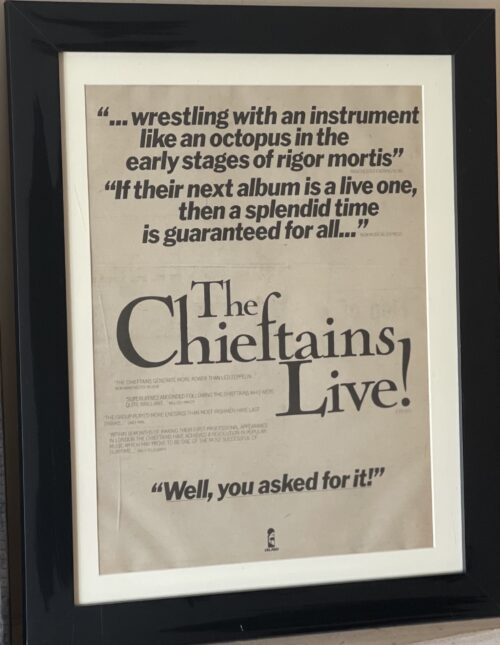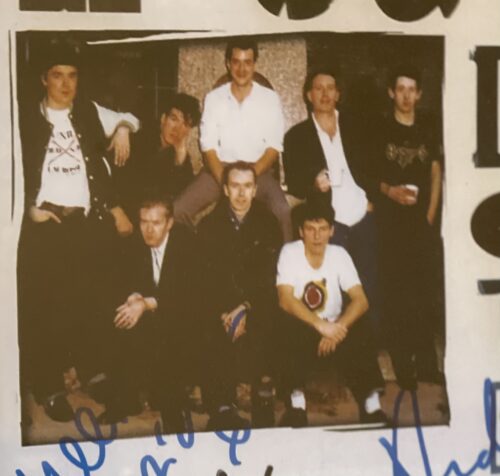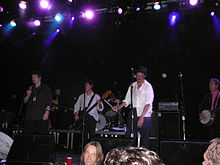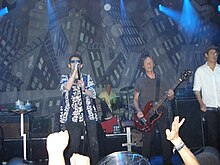Musical beginnings
Kelly had been interested in music during his teenage years: he regularly attended céilithe with his sister Mona and listened to American vocalists including: Fats Domino, Al Jolson, Frank Sinatra and Perry Como. He also had an interest in theatre and musicals, being involved with the staging of plays by Dublin's Marian Arts Society. The first folk club he came across was in the Bridge Hotel, Newcastle upon Tyne in early 1960.Having already acquired the use of a banjo, he started memorising songs. In Leeds he brought his banjo to sessions in McReady's pub. The folk revival was under way in England: at the centre of it was Ewan MacColl who scripted a radio programme called Ballads and Blues. A revival in the skiffle genre also injected a certain energy into folk singing at the time. Kelly started busking. On a trip home he went to a fleadh cheoil in Milltown Malbay on the advice of Johnny Moynihan. He listened to recordings of Woody Guthrie and Pete Seeger. He also developed his political convictions which, as Ronnie Drew pointed out after his death, he stuck to throughout his life. As Drew also pointed out, he "learned to sing with perfect diction". Kelly befriended Sean Mulready in Birmingham and lived in his home for a period.Mulready was a teacher who was forced from his job in Dublin because of his communist beliefs. Mulready had strong music links; a sister, Kathleen Moynihan was a founder member of Comhaltas Ceoltóirí Éireann, and he was related by marriage to Festy Conlon, the County Galway whistle player. Mulready's brother-in-law, Ned Stapleton, taught Kelly "The Rocky Road to Dublin".During this period he studied literature and politics under the tutelage of Mulready, his wife Mollie, and Marxist classicist George Derwent Thomson: Kelly later stated that his interest in music grew parallel to his interest in politics. Kelly bought his first banjo, which had five strings and a long neck, and played it in the style of Pete Seeger and Tommy Makem. At the same time, Kelly began a habit of reading, and also began playing golf on one of Birmingham's municipal courses. He got involved in the Jug O'Punch folk club run by Ian Campbell. He befriended Dominic Behan and they performed in folk clubs and Irish pubs from London to Glasgow. In London pubs, like "The Favourite", he would hear street singer Margaret Barry and musicians in exile like Roger Sherlock, Seamus Ennis, Bobby Casey and Mairtín Byrnes. Luke Kelly was by now active in the Connolly Association, a left-wing grouping strongest among the emigres in England, and he also joined the Young Communist League: he toured Irish pubs playing his set and selling the Connolly Association's newspaper The Irish Democrat. By 1962 George Derwent Thomson had offered him the opportunity to further his educational and political development by attending university in Prague. However, Kelly turned down the offer in favour of pursuing his career in folk music. He was also to start frequenting Ewan MacColl and Peggy Seeger's Singer Club in London.The Dubliners
In 1961 there was a folk music revival or "ballad boom", as it was later termed, in waiting in Ireland.The Abbey Tavern sessions in Howth were the forerunner to sessions in the Hollybrook, Clontarf, the International Bar and the Grafton Cinema. Luke Kelly returned to Dublin in 1962. O'Donoghue's Pub was already established as a session house and soon Kelly was singing with, among others, Ronnie Drew and Barney McKenna. Other early people playing at O'Donoghues included The Fureys, father and sons, John Keenan and Sean Og McKenna, Johnny Moynihan, Andy Irvine, Seamus Ennis, Willy Clancy and Mairtin Byrnes. A concert John Molloy organised in the Hibernian Hotel led to his "Ballad Tour of Ireland" with the Ronnie Drew Ballad Group (billed in one town as the Ronnie Drew Ballet Group). This tour led to the Abbey Tavern and the Royal Marine Hotel and then to jam-packed sessions in the Embankment, Tallaght. Ciarán Bourke joined the group, followed later by John Sheahan. They renamed themselves The Dubliners at Kelly's suggestion, as he was reading James Joyce's book of short stories, entitled Dubliners, at the time.Kelly was the leading vocalist for the group's eponymous debut album in 1964, which included his rendition of "The Rocky Road to Dublin". Barney McKenna later noted that Kelly was the only singer he'd heard sing it to the rhythm it was played on the fiddle. In 1964 Luke Kelly left the group for nearly two years and was replaced by Bobby Lynch and John Sheahan. Kelly went with Deirdre O'Connell, founder of the Focus Theatre, whom he was to marry the following year, back to London and became involved in Ewan MacColl's "gathering". The Critics, as it was called, was formed to explore folk traditions and help young singers. During this period he retained his political commitments, becoming increasingly active in the Campaign for Nuclear Disarmament. Kelly also met and befriended Michael O'Riordan, the General Secretary of the Irish Workers' Party, and the two developed a "personal-political friendship". Kelly endorsed O'Riordan for election, and held a rally in his name during campaigning in 1965.In 1965, he sang 'The Rocky Road to Dublin' with Liam Clancy on his first, self-titled solo album. Bobby Lynch left The Dubliners, John Sheahan and Kelly rejoined. They recorded an album in the Gate Theatre, Dublin, played the Cambridge Folk Festival and recorded Irish Night Out, a live album with, among others, exiles Margaret Barry, Michael Gorman and Jimmy Powers. They also played a concert in the National Stadium in Dublin with Pete Seeger as special guest. They were on the road to success: Top Twenty hits with "Seven Drunken Nights" and "The Black Velvet Band", The Ed Sullivan Show in 1968 and a tour of New Zealand and Australia. The ballad boom in Ireland was becoming increasingly commercialised with bar and pub owners building ever larger venues for pay-in performances. Ewan MacColl and Peggy Seeger on a visit to Dublin expressed concern to Kelly about his drinking.[citation needed] Christy Moore and Kelly became acquainted in the 1960s.During his Planxty days, Moore got to know Kelly well. In 1972 The Dubliners themselves performed in Richard's Cork Leg, based on the "incomplete works" of Brendan Behan. In 1973, Kelly took to the stage performing as King Herod in Jesus Christ Superstar. The arrival of a new manager for The Dubliners, Derry composer Phil Coulter, resulted in a collaboration that produced three of Kelly's most notable performances: “The Town I Loved So Well”, "Hand me Down my Bible", and “Scorn Not His Simplicity”, a song about Phil's son who had Down Syndrome.Kelly had such respect for the latter song that he only performed it once for a television recording and rarely, if ever, sang it at the Dubliners' often boisterous events. His interpretations of “On Raglan Road” and "Scorn Not His Simplicity" became significant points of reference in Irish folk music.His version of "Raglan Road" came about when the poem's author, Patrick Kavanagh, heard him singing in a Dublin pub, and approached Kelly to say that he should sing the poem (which is set to the tune of “The Dawning of the Day”). Kelly remained a politically engaged musician, becoming a supporter of the movement against South African apartheid and performing at benefit concerts for the Irish Traveller community,and many of the songs he recorded dealt with social issues, the arms race and the Cold War, trade unionism and Irish republicanism, ("The Springhill Disaster", "Joe Hill", "The Button Pusher", "Alabama 1958" and "God Save Ireland" all being examples of his concerns).Personal life
Luke Kelly married Deirdre O'Connell in 1965, but they separated in the early 1970s.Kelly spent the last eight years of his life living with his partner Madeleine Seiler, who is from Germany.Final years
Kelly's health deteriorated in the 1970s. Kelly himself spoke about his problems with alcohol. On 30 June 1980 during a concert in the Cork Opera House he collapsed on the stage. He had already suffered for some time from migraines and forgetfulness - including forgetting what country he was in whilst visiting Iceland - which had been ascribed to his intense schedule, alcohol consumption, and "party lifestyle". A brain tumour was diagnosed.Although Kelly toured with the Dubliners after enduring an operation, his health deteriorated further. He forgot lyrics and had to take longer breaks in concerts as he felt weak. In addition following his emergency surgery after his collapse in Cork, he became more withdrawn, preferring the company of Madeleine at home to performing.On his European tour he managed to perform with the band for most of the show in Carre for their Live in Carre album. However, in autumn 1983 he had to leave the stage in Traun, Austria and again in Mannheim, Germany. Shortly after this, he had to cancel the tour of southern Germany, and after a short stay in hospital in Heidelberg he was flown back to Dublin. After another operation he spent Christmas with his family but was taken into hospital again in the New Year, where he died on 30 January 1984.Kelly's funeral in Whitehall attracted thousands of mourners from across Ireland.His gravestone in Glasnevin Cemetery, Dublin, bears the inscription: Luke Kelly – Dubliner. Sean Cannon took Kelly's place in The Dubliners. He had been performing with the Dubliners since 1982,due to the deterioration of Kelly's health.Legacy
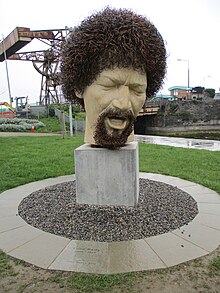
Sculpture of Luke Kelly on Sheriff Street by Vera Klute. Unveiled in 2019

